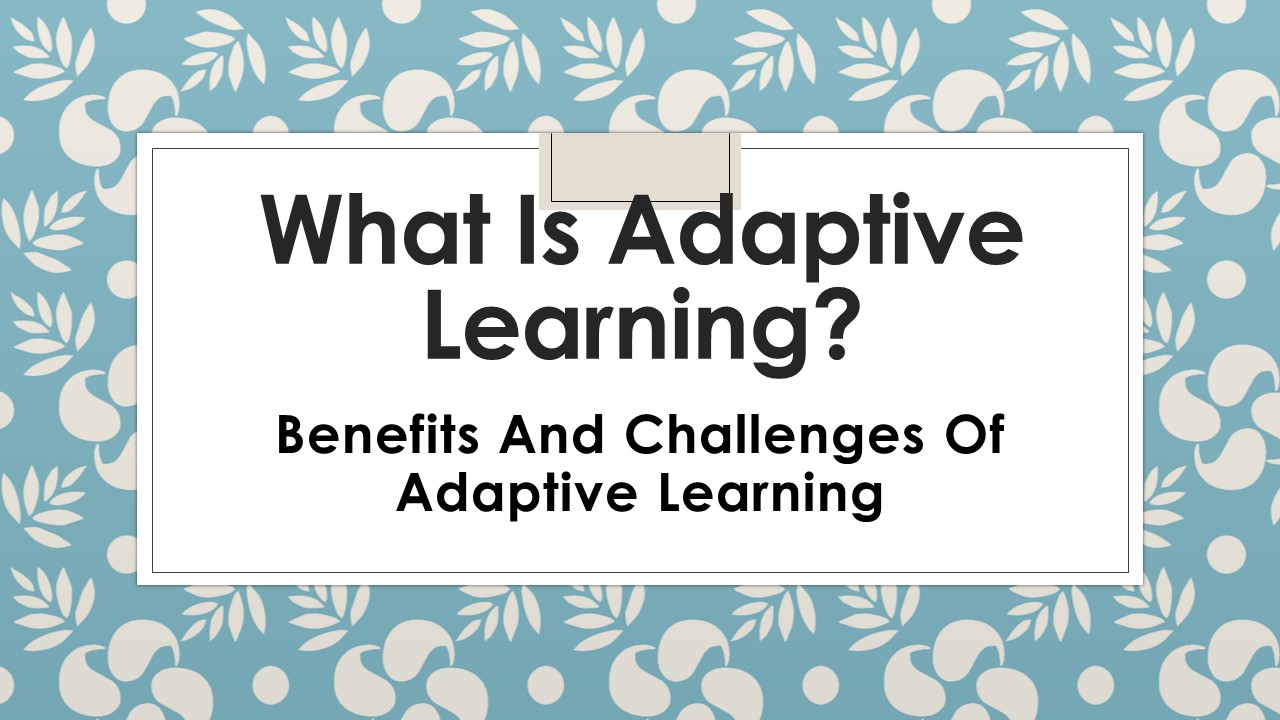What Is Adaptive Learning? - PowerPoint PPT Presentation
Title:
What Is Adaptive Learning?
Description:
In addition to these features, EasySIM provides a highly intuitive and user-friendly interface that makes it easy for students and educators to use the platform. The platform also offers a wide range of multimedia content, including videos, interactive simulations, and gamification, to enhance the learning experience. – PowerPoint PPT presentation
Number of Views:4
Title: What Is Adaptive Learning?
1
What Is Adaptive Learning?
- Benefits And Challenges Of
- Adaptive Learning
2
What Is Adaptive Learning?
- Adaptive learning is a teaching method that uses
technology to personalize the learning experience
for individual students. In adaptive learning,
educational materials and instruction are
customized based on the needs, strengths,
weaknesses, and interests of each student. - Adaptive learning technology uses data analysis,
machine learning algorithms, and artificial
intelligence to collect and analyze information
about a student's performance, including their
progress, strengths, weaknesses, and learning
style. This information is then used to adjust
the content, difficulty level, and teaching
strategies to meet the student's individual
needs. - Adaptive learning can be used in a variety of
educational contexts, including K-12 schools,
colleges and universities, and corporate training
programs. Its benefits include improved learning
outcomes, increased student engagement, and more
efficient use of instructional resources.
3
Benefits Of Adaptive Learning
- Better Faster Progress
- With rising student enrolments and increasing
classroom size in the traditional school system
is one of the issues students face while
learning. This can be overcome by adopting
adaptive learning. Here various educational
platforms and apps can be used by instructors to
segregate students into smaller groups of similar
learning potential, thereby giving enough
attention to each group. - Improved Learning
- The best part of adaptive learning is its
capability to understand students learning
graphs and evaluate their areas of improvement
and strengths in real-time. This creates a room
for optimization of education apps and
customizing them, which can enable students to
learn a topic thoroughly before moving ahead with
complex concepts. - Enhanced Understanding
- In a conventional teaching setting, it is
difficult for the educators to ensure that all
the students have comprehended the topic and are
on the same level of understanding. This can be
prevented with advanced technological apps where
a personalized course of action is created. This
further enables students to learn at their own
pace and they are better equipped to understand a
new topic.
4
- Better Student Engagement
- Students these days are surrounded by
technologically-advanced devices. Adaptive
learning technology can leverage upon this
students love for high-tech. Students these days
engage better with their mobile devices, hence,
educational apps can assist them in learning
through tailored educational programs. These apps
provide an excellent level of immersive
experience which makes learning fun and an
engaging process. - Systematic Student-Teacher Collaboration
- The key advantage of adaptive learning is not
limited to mobile screens, but also can extend to
blended learning. Educators can have complete
access to their students academic performance on
these apps. They have all the required insights
which they require to address in a one-to-one
session. Moreover, it promotes teachers in
imparting education in a more practical and
efficient manner. - Students Feel More Motivated
- Adaptive learning offers students more control
over their learning process, making them feel
more empowered. Also, they have the flexibility
to learn a suitable topic at their own pace,
without waiting for other students who are
lagging behind or the peers who are way ahead in
the course. This approach boosts their confidence
and augments their learning. - Identify Gaps And Get Real-Time Feedback
- The key motive behind adaptive learning is that
the approach is mainly focused on student
knowledge gaps, so identifying them is an
essential part of the strategy, which helps the
educators work on pain points. Also, this method
enables to give real-time feedback to students by
analyzing their academic performance and provide
additional support wherever needed. - Improves Engagement And Supports Learning For
Diverse Groups - Adaptive online learning makes students engage
with their peers and teachers to learn better,
clear doubts, and participate in quizzes
discussions. With increasing diversity among
students belonging from different cultures and
countries, adaptive technology overcomes the
language barrier and ensures suitable learning
content material is provided to everyone.
5
Challenges Of Adaptive Learning-
- Technical Issues Adaptive learning technology
relies on complex algorithms and data analysis,
which can be difficult to implement and maintain.
Technical glitches, software bugs, and
compatibility issues can also cause problems and
impact the effectiveness of the system. - Data Privacy and Security Adaptive learning
systems collect and store sensitive data about
students, including their learning progress,
strengths, weaknesses, and personal information.
Ensuring the privacy and security of this data is
critical to prevent unauthorized access or
breaches. - Content Quality and Diversity Adaptive learning
systems rely on high-quality and diverse content
to be effective. Ensuring that the content is
relevant, up-to-date, and inclusive is essential
to provide students with a comprehensive and
engaging learning experience. - Training and Support Educators and students need
adequate training and support to use adaptive
learning technology effectively. Providing
ongoing training and technical support can be
challenging, especially for institutions with
limited resources or technical expertise. - Cost Implementing and maintaining an adaptive
learning system can be expensive, especially for
smaller institutions or schools with limited
budgets. The cost of developing or licensing
quality content, and the cost of maintaining the
technology can be significant barriers to
adoption.
6
(No Transcript)































